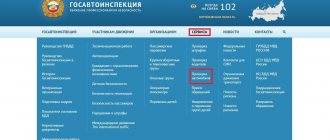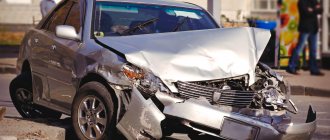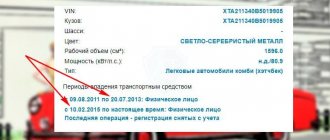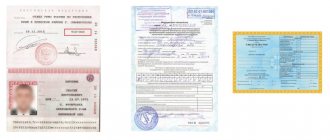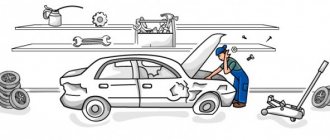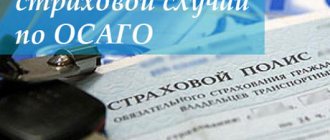AutoYurait.rf / Registration and accounting
Back
Published: March 24, 2019
Reading time: 7 min
10
2323
When purchasing a car, a potential buyer may find that the car is subject to a registration ban. Is this circumstance something dangerous for the buyer? In what cases is this prohibition imposed? And how is the ban lifted? These issues will be discussed below.
- Prohibition on registration actions - what is it? Who can impose a ban?
- Who is lifting the restrictions?
- Arrest, ban and restriction - is there a difference?
- Check through the traffic police website
- How to remove the ban in case of sale?
- Is it possible to drive a car with a trailer that is restricted?
- Is it possible to speed up the lifting of the ban?
Prohibition on registration actions - what is it?
A registration ban is an administrative measure according to which the car owner loses the right to any registration actions regarding the vehicle. The object of the ban can be either a car or a trailer. After the ban is imposed, a person can continue to drive such a car, but he cannot re-register it to another person (the rules are similar for a trailer).
A ban on registration actions is imposed if the driver fails to fulfill his civil obligations (late fine, refusal to pay alimony, etc.), as well as in the event of theft of the car.
Who can impose a ban?
The imposition of a ban is carried out only on the basis of a court decision or a special act - a resolution that is issued and stored in the Bailiff Service (FSSP). The following organizations may act as initiators of the ban:
- The courts themselves. Most often this happens in the case of resolving controversial issues that relate to the division and/or sale of property. For example, during a divorce, the car remained with the ex-husband, but the court ordered the ex-wife to pay certain monetary compensation - in this case, the court may additionally impose a registration ban on such a vehicle.
- Customs. If during registration a person does not pay customs duties, then these authorities can, through the court, impose a ban until the debts are repaid.
- Police. If the car was stolen, then it is quite likely that the thief will want to resell the car - to reduce the likelihood of such a transaction, the police may require the court to impose a ban.
- Traffic police If the traffic police inspector imposes a fine on the driver, and the driver evades paying the fine, the traffic police may go to court to impose a ban.
- Social services. If the ex-husband has a car, but he does not pay child support, then the mother can contact social authorities to prohibit her husband from registering.
More on the topic: Classification of vehicles according to technical regulations
Who is lifting the restrictions?
After a ban is imposed through the court, the case is transferred to the FSSP. To lift the ban, the owner of the car must first fulfill his obligations, which he evades, and then the body that initiated the ban lifts it. For example, the measure in question was imposed due to a traffic fine - in this case, the person must contact the traffic police and make payment. Restrictions can also be lifted through the court (for example, if the ban was imposed by mistake).
Arrest, ban and restriction - is there a difference?
Remember that there is a difference between the seizure of a vehicle, a ban on registration and a restriction on property rights regarding a car. Main differences:
- The registration ban applies only to situations where re-registration of car documents is required. Even if the court has imposed a ban, the owner still has the right to drive the vehicle or use the car as collateral. Theoretically, such a car can be sold, although in practice it is unlikely that anyone will want to buy such a car, since it will not be possible to register it in their name.
- The restriction on the exercise of property rights only affects the possibility of transferring the car to another person. That is, you cannot sell such a car or use it as collateral.
- An arrest implies the removal of a car from use (most often, vehicles are confiscated in favor of the FSSP). If the court issues a seizure order, the person is deprived of all rights to the car, and the seizure can be carried out using compulsory measures.
Who can ban the registration of a car?
Representatives of several government services can make a decision on the registration of a car.
| Who issues the ban? | Reasons for imposing restrictions |
| Customs Service | Incorrectly carried out registration procedure when importing foreign cars, in the event of possible fraud on the part of the owner, provision of deliberately incorrect data to a customs officer, etc. |
| Investigative authorities | If the vehicle is involved in a criminal case of theft. |
| State Road Safety Inspectorate | The car was involved in an accident and as a result received damage to the body parts on which the VIN number is located. If identification of the license plate is difficult or impossible, the inspector has the right to ban the registration of the vehicle. |
| Social service bodies | If the car is the subject of a dispute during the division of property involving minor children. |
| Court | Such a decision will be made if the car is the subject of a dispute during the division of property or before a decision on the right of inheritance is made. Also, a ban may be issued if a vehicle was provided as security for the claim. |
| FSSP (Federal Bailiff Service) | If the owner has unpaid debts for housing and communal services, loans. The owner also has several unpaid receipts for traffic police fines. |
How to check a car for restrictions?
Information about the ban is stored in the traffic police database, and you can check this information using the traffic police website or the FSSP. Below we will look at these verification methods.
Check through the traffic police website
The check is carried out like this:
- Open the traffic police website, select “Services” and “Car check” or follow the direct link https://gibdd.rf/check/auto.
- Enter the vehicle’s VIN code, select “Restrictions” and click the “Request Verification” button. Wait for the operation to complete.
- If there is a ban, then a special window will pop up, where all the basic information about the ban will be indicated (the basis for imposing the ban, the court order, the name of the bailiff, and so on). If there is no prohibition, a window will pop up indicating that the relevant information was not found.
Check through the FSSP
You can also check the information through the Bailiffs website:
- Open the FSSP website, select “Services” and “Bank of Production” or follow the direct link https://fssprus.ru/iss/ip.
- Enter your region of residence, full name and date of birth, and then find the “Find” button. At the end, a window will open in which it will be indicated whether the machine is prohibited or not.
- Using the FSSP website, you can also find out the details of the ban: to do this, through the traffic police website, find the resolution on imposing restrictions and copy the resolution number - then in the search menu on the FSSP website, select “Search by individual entrepreneur”, insert the resolution number and click the “Find” button "
More on the topic: New certificate of accident from October 20, 2021
How to remove the ban?
To remove the restrictions, you must fulfill your obligations, evasion of which served as the basis for imposing the restriction. In general, the algorithm is like this:
- Find the ruling. This can be done using the traffic police or FSSP website (we discussed this issue above). You can also submit a request through a personal visit to the MREO.
- Read the resolution to find out what served as the basis for the ban. If you do not agree with it, then collect documents and go to court to protect your rights.
- If you agree with the resolution, then you must fulfill your obligations, which you are avoiding. For example, you still have a traffic fine - in this case, the fine must be paid off.
- After paying all fines, you need to contact the authority that initiated the ban. You need to submit an application to this body with a request to cancel the registration ban (you also need to take your passport and documents for the car with you). As a result, you should be given a decree to lift the ban.
- In some cases, at the end you should also submit a copy of the decision to lift the ban to the FSSP.
Is it possible to sell a car that is banned?
Yes, you can sell a car with a ban, but in practice this makes little sense. After all, the new owner will not be able to re-register the car in his own name until you lift the ban, and the new owner will not be able to drive the car without registration. Therefore, it is unlikely that anyone will want to buy a car that they cannot drive. Selling a car with a ban is also stupid because transport taxes and fines will be paid to the old owner.
How to remove the ban in case of sale?
The procedure here will be standard - search for a resolution on the traffic police website, pay fines, receive a paper on lifting the ban, transfer information to the FSSP, and so on. Please note that the driver must deal with all these matters, however, if a power of attorney is concluded, the buyer can also be involved in lifting the ban.
Is it possible to buy a car with a registration ban?
Purchasing a vehicle with a registration ban is always fraught with certain problems and carries serious risks. Unfortunately, not every buyer knows what exactly he will have to face. And the seller is in no hurry to reveal his cards. For example, some sellers hide the fact of existing restrictions. And the buyer learns about them only when he begins the car registration procedure.
At the same time, the former owner can offer an impressive discount, the condition for obtaining which is the use of the car by proxy. In this case, the new buyer must understand that the previous owner can revoke the power of attorney for the right to drive the car at any time. Or not repay your debt to the state. Consequently, the ban on registration actions may not be lifted for many years.
Does it make sense to buy a car with restrictions?
It is not recommended to buy a car with restrictions, since you will not be able to re-register it in your name until the former owner removes the restrictions. Since re-registration is not available to you, you will not be able to obtain a license for the car, so you will not have the legal opportunity to drive the car. Actual driving of such a car is equivalent to driving a vehicle without documents, for which a fine and suspension from driving followed by evacuation are provided.
More on the topic: Road repairs have been completed, but temporary signs have not been removed - is the fine legal?
There is a limitation on the car - what can you do with it?
The ban on registration actions only applies to actions related to the re-registration of a car to another person. Therefore, a prohibited driver can drive a car, transport goods, take out insurance for a vehicle, buy other cars, and so on. However, please note that in the future the FSSP may take more serious measures. For example, in the case of a large outstanding fine, the bailiffs may additionally issue an order to seize the car - in this case, the person will be removed from driving and the car will be confiscated.
Is it possible to drive a car with a trailer that is restricted?
Yes, you can. If a registration restriction is imposed on a trailer, then the same rules apply as in the case of a car (you cannot re-register the trailer, but you can operate it in any way). There are no penalties for this.
Is it possible to circumvent the law if the car is seized?
If the FSSP has made a decision to seize the car, but the confiscation has not yet occurred, then you can use one trick - when searching for cars, traffic police officers use a database that applies only to the current region, and information from other regions is not available to them. For example, a car is registered in the Leningrad region, and a traffic police inspector stopped you on the road in the Moscow region - in this case, after a check, you will be released, since the check will show that you are clean before the law.
How to dispose of a car with a registration ban?
Car owners often ask whether their car can take part in the recycling program. It should be understood that before a vehicle is disposed of, it must be deregistered. And traffic police officers refuse to allow the owner to carry out this procedure, citing the existing ban from government agencies. That is, the owner can take part in the recycling program only after he has paid off all debts to the state and resolved controversial issues with government agencies.
Attention
Attempts to illegally dispose of a car (by sawing it into pieces, setting it on fire and other illegal methods) will not help in solving this problem. The fact is that until the car is deregistered with the traffic police, the owner will have to pay transport tax every year.
What should I do if I have paid my debts, but the ban is not lifted?
According to the law, after paying debts, the ban must be lifted within 3 days, excluding weekends and holidays. If this period has passed and you are still listed in the debtor database, then you should write a complaint and send it by mail to the traffic police and the FSSP. If nothing has changed after filing a complaint, you need to go to court.
Is it possible to speed up the lifting of the ban?
It is almost impossible to speed up the lifting of the ban. However, you can speed up the time for submitting complaints - to do this, you do not need to send the complaint by mail, but hand it over in person to the traffic police and the FSSP.
Deadline for lifting the ban on car registration
You should not assume that once all issues have been resolved, you will be able to register your vehicle immediately. Experts remind that even after paying the debt on fines and tickets, receiving a court order or other documents confirming the absence of controversial issues and debts, several days will pass before the car can be registered.
What is the waiting time for the ban on car registration to be lifted? Let's consider each stage of solving this problem:
- Enforcement proceedings will be terminated within 5 days after the funds deposited to pay the debt (fines, housing and communal services, loans) are transferred to a special account.
- After the enforcement proceedings have been terminated within 3 days, a decision is made stating that there are no financial claims against the debtor. It is during this period that government agencies must lift the ban on registration actions. This period is regulated by Federal Law 229, Article 46.
Consequently, at least 8 days pass from the moment the debt is repaid until it is possible to register the car. Documents must be transferred to the traffic police a maximum of 7 days after the termination of enforcement proceedings. But the use of e-mail often leads to an increase in this period.
